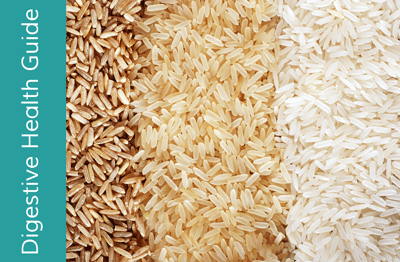
Small bowel obstruction is a potentially life-threatening condition. Even in relatively less serious cases, bowel obstruction can completely disrupt your daily life. Obstructions are caused by adhesions or internal scars that form in the small intestines (small bowel) and sometimes in the large intestines (colon). Adhesions form as the first step in healing from surgery, infection, inflammation, or trauma. Adhesions are a primary cause of obstruction, or blockage, in the bowel. Regardless of where they form, adhesions join structures with strong glue-like bonds that prevent them from functioning properly.
The good news is that certain diet changes can serve as an important adjunct to your treatment and help you manage the symptoms of digestive disorders like bowel obstruction, which range from uncomfortable to debilitating.
For a complete overview of these diet recommendations, recipes, and sample menus, download our Bowel Obstruction Diet Guide. Take a peek inside the Digestive Health Guide’s Table of Contents.
Reducing the amount of fiber in your diet can cause fewer bowel movements and smaller stools. This can reduce gas, abdominal cramps, and pain. As a result, Low or Minimal Fiber Diets are typically recommended for patients with digestive issues.
If your symptoms are mild, a Low-Fiber Diet may be appropriate for you. With severe symptoms, you may need to follow a stricter Minimal Fiber Diet or a Liquid Diet. The length of time that you should follow any of these diet options will depend on your individual condition and symptoms.
It is important that your doctor is aware of any dietary changes you make. Please notify your doctor immediately if you experience changes in bowel movements, such as:
- constipation
- nausea
- vomiting
- pain
Remember, digestive disorders affect each person differently. Therefore, finding out which foods your body reacts well to – and doesn’t – may be a process of trial and error. Be patient and you will find the ideal balance of foods that can help you manage your condition.
Watch Dr. Oz explain adhesions:
You may wish to take a look at the clip in which Dr. Oz covers the dangerous condition. In the short video, he takes a visual look at what happens in one’s intestines when an obstruction occurs.
*Please consult your physician prior to making any diet changes.
Related Content:
Research and Success Rates
- Study Results for a Non-Surgical Bowel Obstruction Treatment
- Study Results for a Non-Surgical Bowel Obstruction Treatment
- Bowel Obstruction Success Rates
Questions Answered
- Recurring Small Bowel Obstruction Treatment Frequently Asked Questions
- The Most Common Causes of Bowel Obstruction and How to Prevent It
- Bowel Blockage Symptoms
- How to Prevent Bowel Obstruction
- Can Diverticulitis Cause Bowel Obstruction?
- Seven Signs of Intestinal Blockage
- What to know before accepting an IBS Diagnosis
- How Long Does a Bowel Obstruction Last?
- What is the Cause of a Small Bowel Obstruction and What Are Your Options for Treatment?
- How Will My Lifestyle Change with Small Bowel Obstructions?
- Is There a Natural Treatment for Small Bowel Obstruction?
- What SBO Patients Can Expect From Treatment
Treatment
- At a Glance: Bowel Obstruction
- Bowel Obstruction
- Bowel Obstruction – Need Help Now?
- Bowel Obstruction Treatment
- [Infographic] The Main Causes of Bowel Obstructions
Patient’s Stories
- Bowel Obstruction: Patient Story Update
- Video Testimonial – A Mother’s Journey to Recovery: Small Bowel Obstruction
- What Is Bowel Obstruction? – A Patient’s Perspective
- A Glimpse into a Brave Young Boy’s Journey with CHARGE Syndrome
- Success Story: Clear Passage Allowed Me to Resume My Adventures
- Emergency Small Bowel Obstruction Surgery in India
- An End to Bowel Obstructions
Diet
- How to Relieve a Bowel Obstruction: Diet Guide
- Recipes For Bowel Obstruction Patients
- Diet Guide for Avoiding Bowel Obstruction
- Diet Modifications to Help You Handle a Small Bowel Obstruction
- Digestive Health Guide
- Bowel Obstruction: Diet & Lifestyle Recommendations
- Minimal Fiber Diet for Digestive Disorders
- Nutritional Guidelines
- Transitioning to a Regular Diet from a Low or Minimal Fiber Diet
- Low Fiber Diet for Digestive Disorders
Bowel Obstruction | SBO | SIBO


